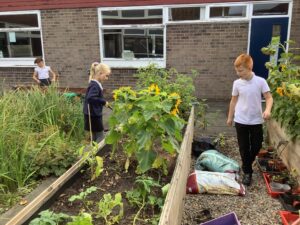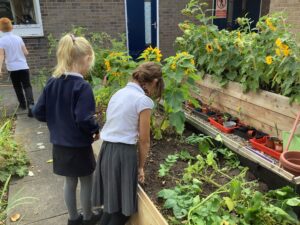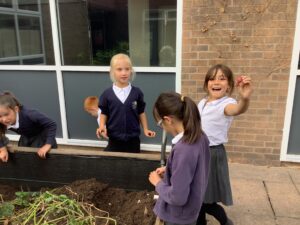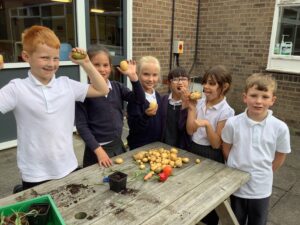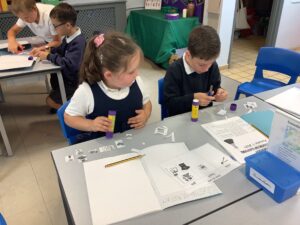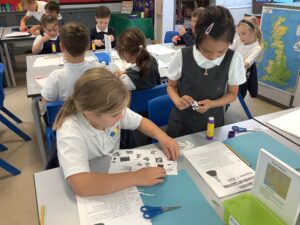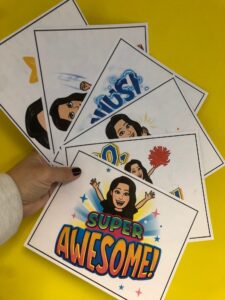This week’s message come from our Science and Foundation Subjects Leader, Mr Wilks, who’s based at Moortown Primary. The message is about the current topic that children in Years 1-6 are learning about this half-term: Geography. It’s a long message – you could skip to the last section on helping your child at home if you need to. (There are links to the recent Zoom sessions on phonics and Early Years at the end, too.)
What do we mean by topics?
Topics are the vehicle for delivering much of the learning in the foundation subjects (eg history, art, geography, DT). Each half-termly topic has a driving subject – the main focus for teaching pupils the knowledge and skills they need to succeed in life. The driver changes with each topic to ensure a broad and balanced curriculum.
Although the learning in each topic will be provided by the driving subject, there are opportunities for enrichment through other subjects. For example, learning in a history-driven subject may be enriched by observational drawing of an artefact.
Read more about the intent, implementation and impact of our topics.
What is this half-term’s topic?
This half-term, the topic is called Where in the world am I? and your child’s a geographer.
In this geography-driven topic, we’re focusing on the geography of the United Kingdom and helping to develop the children’s sense of where they live through the use of fieldwork. Each phase has age-related specific knowledge, skills and vocabulary that they’ll learn, use and apply across the topic.
Children in Years 1 and 2 will learn about the different countries that make up the United Kingdom and their capital cities. They’ll learn about the difference between physical and human geography and identify examples of both in the local area. They’ll also be learning about the four compass points and using geographical vocabulary to describe what is north, south, east or west of them. Fieldwork in the local area may include taking photographs of features in the local area and then locating them on a map. It could also involve conducting a survey about what they like and dislike about their local area. They may even survey parents or members of the local community.
Children in Years 3 and 4 will develop their locational knowledge by using maps and atlases to locate some of the other cities in the United Kingdom. They’ll learn about counties and use the eight compass points to describe their locations. The big focus for this phase is on maps. They’ll learn how to use Ordnance Survey maps and their keys. They’ll learn about four figure grid references and use these to locate features. They’ll then apply this learning more locally by mapping a route to school.
Children in Years 5 and 6 will learn about National Parks, using maps to locate them. Like Y3,4 they’ll also use Ordnance Survey maps but this time they’ll be tasked with using six figure grid references to locate places. Importantly, they’ll get an understanding of how a geographer works by completing fieldwork on urban green spaces.
How can you help?
Regardless of the year group your child is in, Google Earth is a brilliant tool to help develop children’s understanding of their sense of place in the world. Zoom right in on your home and then zoom out to reveal the area of Leeds that you live in. Zoom further out to see what city you live. Zoom further for the county. A little further and you might start to spot some National Parks. Further still and you can see the country that we live in. Keep zooming and you’ll see the continent we live in (though this isn’t labelled). Before you know it, you’re floating in space and circling the Earth!
Google Maps is another great tool for investigating where you live. Try the Street View option and you can walk along your street. You can even toggle between different data points to see what your house or garden looked like in previous years. (My lack of gardening skills were laid bare in a staff meeting when we compared my unkempt garden in 2020 to the lush, wildlife haven the previous owners had lovingly created in 2008!)
Quizzing your children about some locational knowledge will help them to remember important information. I’ve listed some examples below. Use the age-related expectations to find the right pitch for your child.
- What country do we live in?
- Which county do we live in?
- Which city do we live in?
- Which part of Leeds do we live in?
- Which four countries make up the United Kingdom?
- Which National Parks are located in Yorkshire?
If you can, go to the library and get some geography-related books, especially an atlas. You could compare maps of the same place to see what type of information they show. For example, you find lots of maps of the United Kingdom. One might show the countries and capital cities. Another might show the mountains, rivers and National Parks. Another might give information about the climate.
Children could draw a plan/map of their bedroom with a key. Older children could try to do this for each room of their house. You could also create a map of a mythical location with an accompanying key.
For children in Years 3-6, there are lots of different games and activities on Ordnance Survey Mapzone. I especially like the jigsaws in the Map Puzzles section of the Games.
Also for older children, there are lots of information and some tasks and quizzes on BBC Bitesize.
Thanks to Mr Wilks for this guided tour of our Where in the World am I? topic. As always with learning at home, keep it simple and make it fun.
Thank you to everyone who has attended our recent Zoom sessions to help you support your child at home. Watch the phonics session and the Early Years introduction. (And apologies for the distracting cursor in the latter – maybe that’s a nervous habit of mine!)
Enjoy your weekend.
